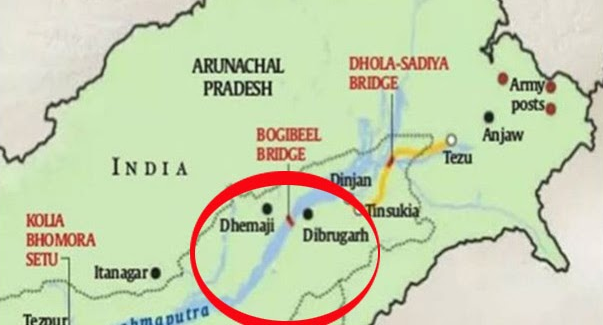Prime Minister Narendra Modi inaugurated Bogibeel bridge over Brahmaputra at Bogibeel in Assam. He also flagged off the first passenger train Tinsukia-Naharlagun Intercity Express over the bridge.
Boghibeel Bridge:
- It is built over Brahmaputra River at Bogibeel between Dibrugarh and Dhemaji districts of Assam
- At 4.94 km, the Bogibeel Bridge is the country’s longest road-cum-rail bridge, and its fourth longest of any kind above water.
-
- It was approved by the Cabinet Committee on Economic Affairs in 1997.
- The foundation stone was laid that year by then Prime Minister H D Deve Gowda, and construction was inaugurated in 2002 by then PM Atal Bihari Vajpayee.
- Work on the substructure began in 2008.
Background: The proposal to make the bridge dates back to the Assam Accord of 1985.
-
- The Bogibeel Bridge upstages the 4.62-km Vembanad rail Bridge between Edappally and Vallarpadam in Kochi, Kerala, as well as the 4.55-km Digha-Sonpur rail-cum-road Bridge across Ganga in Bihar.
- In a comparison of all bridges across water, the Bogibeel comes in at fourth, after the neighbouring Dhola-Sadiya road bridge (9.15 km), the Patna-Hajipur road bridge (5.75 km), and the Bandra-Worli Sea Link (5.6 km).
- In October, the Centre announced a plan for construction of a 19-km bridge over the Brahmaputra from Dhubri in Assam to Phulbari in Meghalaya. Once that happens, three of India’s five longest bridges would be running across the country’s widest river.
Comparison to other bridges:
Tinsukia-Naharlagun Intercity Express:
- On the occasion, PM Modi also flagged off the first passenger train Tinsukia-Naharlagun Intercity Express over the bridge.
- It will run five days a week and use the bridge to cut down the train-travel time between Tinsukia in Assam to Naharlagun town of Arunachal Pradesh by more than 10 hours.
Significance:
- The bridge is of immense economic and strategic significance for the nation. The bridge will be the lifeline of North East region and will facilitate connectivity between North and South Banks of river Brahmaputra in the Eastern region of Assam and Arunachal Pradesh.
- Distance reduction: Within the Northeast, the train journey between Assam and Arunachal Pradesh now reduces from 500 km to 100 km. For the rest of India too, Dibrugarh becomes accessible without travelling via Guwahati.
- Economic: It also benefits tourists and those involved in trading goods.
- Health of the residents: It also benefits those seeking medical treatment. Dibrugarh, considered a gateway to parts of Arunachal Pradesh, is home to Assam Medical College. For patients on the north bank, the only crossing into Dibrugarh so far was by ferry.
- Strategic significance: This boosts the defence forces by facilitating quicker movement of troops and equipment to areas near the India-China border.











